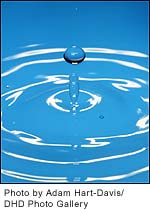 Sustainable water use securing food production in dry areas of the Mediterranean region
Sustainable water use securing food production in dry areas of the Mediterranean region
Project acronym: SWUP-MED
Title of project: Sustainable water use securing food production in dry areas of the Mediterranean region
Research area: Agriculture & Forestry (Annual food crops with improved tolerance to multiple abiotic stresses)
Contract No: 212337
EU contribution: €2 728 000 000 EUR
Start date: June 2008
Duration: 48 months
Food crop production is restricted in the Mediterranean region. Typical crop cultivation under semi-arid and arid conditions in Mediterranean countries, affected by multiple abiotic stress factors further influenced by climate change, are cereals in low yielding monoculture or eventually combined with fallow.
| Project number | 10257048 | ||
|---|---|---|---|
| Subject(s) | AGRICULTURE , ANALYSIS AND TESTS , CHARACTERISTICAL PARAMETERS OF WATERS AND SLUDGES , DRINKING WATER , DRINKING WATER AND SANITATION : COMMON PROCESSES OF PURIFICATION AND TREATMENT , ENERGY , FINANCE-ECONOMY , HEALTH - HYGIENE - PATHOGENIC MICROORGANISM , HYDRAULICS - HYDROLOGY , INDUSTRY , INFORMATION - COMPUTER SCIENCES , MEASUREMENTS AND INSTRUMENTATION , METHTODOLOGY - STATISTICS - DECISION AID , NATURAL MEDIUM , POLICY-WATER POLICY AND WATER MANAGEMENT , PREVENTION AND NUISANCES POLLUTION , RISKS AND CLIMATOLOGY , SANITATION -STRICT PURIFICATION PROCESSES , SLUDGES , WATER DEMAND , WATER QUALITY | ||
| Acronym | SWUP-MED | ||
| Geographical coverage | Morocco, Denmark, Portugal,United Kingdom,Australia, Egypt, Syria, Turkey, Italy | ||
| Budget (in €) | 3929765 | ||
| Programme | FP7-KBBE | ||
| Web site | http://www.swup-med.dk/ | ||
| Objectives | The strategic objective of the project is to improve food crop production in the Mediterranean region, influenced by multiple abiotic stresses. These stresses are becoming even more pronounced under changing climate, predicted to result in drier conditions, increasing temperatures, and greater variability, causing desertification. |
||
| Results | Expected impacts The project is expected to create a general awareness of problems arising from stress caused by potential climate change in the Mediterranean region, as well as outlining solutions dealing with such abiotic stresses. In particular, it will help economic development in non-European Mediterranean countries. Expected results The project should result in the identification of more diverse farming systems with improved productivity and sustainability on a range of agricultural land types under varying climatic conditions. It will accelerate the adoption of improved agricultural practices and technologies to meet future constraints imposed by climate changes. SWUP-MED will provide guidelines and recommendations for farmers and extension services detailing the best management of water, crops, soil and field under a wide range of possible abiotic stresses. The project is expected to identify new traits within cereal crops, creating climate-proof varieties of stable yield and quality, and will test the new crops in terms of their potential to cope with multiple stress factors in target environments. It will provide results from studies on soil water conservation and supplemental irrigation from test fields, as well as indicating the effects of using marginal-quality water (saline water and treated wastewater) on soil properties, such as soil salinisation and the presence of undesirable constituents like nitrates and heavy metals. A model will be produced to describe the effect of such water management on water-use efficiency, salinity distribution and crop yield. It will produce guidelines and recommendations for farmers and extension services on best management of water, crops, soil and field under multiple abiotic stresses. By enhancing our understanding of social and economic factors affecting local farmers, it will evaluate their willingness to adopt the proposed farming systems and new crops and identify local policy impacting on farming systems, new crops, water saving and food safety. To maximise the exploitation of the results it will generate papers, reports, methodology and guidelines to both stakeholders and policy-makers. Website of project:www.swup-med.dk/ Contacts: Coordinator: Sven-Erik Jacobsen, seja@life.ku.dk Organisation: Copenhagen University, Denmark, www.ku.dk Partners International Centre for Agricultural Research in the Dry Areas, Syria, www.icarda.org National Research Council, Italy, www.cnr.it Institute of Agriculture and Veterinary Science II, Morocco, www.iav.ac.ma Centre for Environment and Development for the Arab Region and Europe, Egypt, www3.cedare.int The University of Western Australia, Australia, www.uwa.edu.au University of Cukurova, Turkey, www.cu.edu.tr Natural Environment Research Council, UK, www.nerc.ac.uk Instituto De Tecnologia Quimica E Biologica - Universidade Nova De Lisboa, Portugal, www.itqb.unl.pt |
||
| Period | [01/07/2008 - 30/06/2012] | ||
 you are not logged in
you are not logged in





